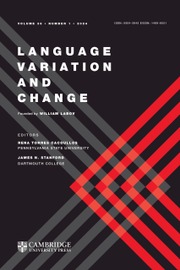Article contents
Politeness-induced semantic change: The case of quand même
Published online by Cambridge University Press: 03 May 2005
Abstract
This article contributes to a growing body of theory that posits language-external, social factors as a primary motor in diachronic change. Politeness theory and the use of variationist approaches enable us to posit, and test, the hypothesis of a type of pragmaticalization, which I call Politeness-Induced Semantic Change (PISC). Historical data on quand même are presented that give tentative credence to such a model. Moeschler and de Spengler's (1981) and Waltereit's (2001) speech-act theoretic analyses of quand même are reinterpreted within the framework of politeness theory and sociopragmatics. The ensuing corpus investigation of the grammaticalization and pragmatico-semantic evolution of quand même from 1500–2000 highlights the fact that not only the innovation but also the propagation of a new form–function configuration depend on social factors; politeness theory may have explanatory power in capturing the ever-changing social patterning of linguistic features and the conditions that favor the spread of innovation.I wish to acknowledge the very helpful and detailed comments of Maj-Britt Mosegaard Hansen and anonymous reviewers from Language Variation and Change on a draft version of this article. Remaining inadequacies are, of course, entirely my own. I also recognize a debt of gratitude to the Research Committee of the Faculty of Humanities, Languages and Social Sciences of the University of the West of England, Bristol, who granted me the research leave required to complete the article.
Information
- Type
- Research Article
- Information
- Copyright
- © 2005 Cambridge University Press
References
REFERENCES
- 14
- Cited by

